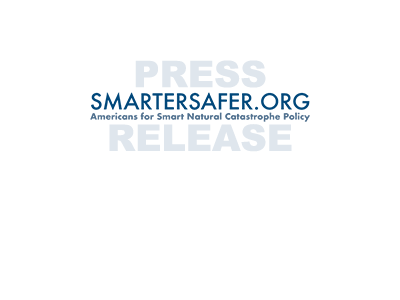Washington, DC – November 1, 2024 – The SmarterSafer Coalition submitted the following comment letter to House Leadership.
Dear Speaker Johnson, Leader Schumer, Leader Scalise, Leader McConnell, and Leader Jeffries:
SmarterSafer is a national coalition that includes a diverse chorus of voices who champion a united front for environmentally responsible and fiscally sound approaches to natural catastrophe mitigation and public safety. The coalition focuses on several policy areas, including flood and wildfire risk, extreme heat, infrastructure investment, environmental protection and conservation, and overall responsible stewardship of taxpayer dollars.
Our hearts go out to those affected by the devastation caused by Hurricanes Helene and Milton and storms that ravaged the Midwest earlier this year. While the losses are heartbreaking, the stories of resilience and community spirit are inspiring. SmarterSafer extends our sincere gratitude to the first responders, community leaders, federal agencies, and elected officials who have worked tirelessly to assist those impacted by these catastrophic events.
Every year, we witness the devastating impact of natural disasters—homes destroyed, livelihoods lost, and communities left to rebuild from the ground up. The human toll is immeasurable, and we have an obligation to do everything we can to prevent such devastation in the future. According to data from the U.S. Chamber of Commerce, every $1 invested in pre-disaster mitigation saves up to $13 in federal spending. SmarterSafer urges Congress to take the necessary steps to lessen the financial burden on taxpayers and better protect communities.
As we assess the post-disaster recovery costs—$34 billion from Hurricane Helene, as reported by Moody’s, and the estimated $30–50 billion in insured losses from Hurricane Milton, according to Fitch3 — it is essential to consider how we can better support communities now and in the future. While we acknowledge the necessity of a disaster supplemental to aid immediate recovery, we believe this moment also presents an opportunity to significantly reduce future financial burdens through proactive measures.
Investing in pre-disaster and nature-based mitigation and resilience strategies in hurricane- and flood-prone areas can save lives, protect communities, and reduce the financial burden on taxpayer-funded federal resources. It is essential that these pre-disaster mitigation and resiliency initiatives be tailored to the specific needs of the regions they are intended to serve. Policymakers have shown commitment to resiliency and mitigation through bipartisan support for programs such as the Building Resilient Infrastructure and Communities (BRIC) Program and the Community Disaster Resilience Zones (CDRZ) Program, for example. The BRIC Program provides substantial financial backing for state and local infrastructure projects, while the CDRZ Program identifies the most at-risk areas, ensuring that critical funding is directed to communities for both immediate projects and the development of long-term solutions. Part of the solution must be the option to continue to use these programs to promote investments in nature-based solutions such as floodplain restoration and culvert upsizing which have proven to be cost-effective in reducing the risk and impacts of extreme flood events. We encourage Congress to expand these initiatives to better protect disaster-prone areas.
As it examines the federal disaster response apparatus, Congress must also address the National Flood Insurance Program (NFIP). The NFIP, set to expire on December 20th, will likely continue to be paired with the appropriations process and receive another short-term extension, as has been the case for many years. As storms intensify and losses increase, meaningful reform of the NFIP is absolutely necessary. The program is facing substantial debt and a financially untenable future. Since 2005, the NFIP has incurred $6.7 billion in interest, with $1.7 million accruing daily. These figures are unsustainable, especially as flood risks continue to rise. The NFIP, along with the federal flood risk management system, requires significant reform. Affordability must be a key consideration, alongside pre-disaster mitigation, nature-based solutions, and risk transfer strategies.
Additionally, greater efforts are needed to protect communities, especially those historically disadvantaged that often face the highest flood risks. Property owners should receive greater incentives at local, state, and federal levels to invest in mitigation measures. Furthermore, means testing should be integrated into NFIP policy pricing, to ensure additional support for low- to moderate-income policyholders, while preventing taxpayers from subsidizing second homes for the wealthiest individuals. Such alterations would help establish a stable funding mechanism to effectively support mitigation efforts and foster resilience in vulnerable communities.
To steer the NFIP away from persistent deficits, Congress must implement risk-based pricing that accurately reflects the flood risk associated with a property in addition to promoting fairness and encouraging risk reduction. Enhancing the program’s ability to cover its costs by expanding the role of private insurance and risk transfer mechanisms would also better equip FEMA to fund the program and assist policyholders after catastrophic flooding events.
The devastation wrought by Hurricanes Helene and Milton serves as a stark reminder of the urgent need for transformative action and forward-looking change. By prioritizing pre-disaster investments and ensuring the NFIP’s stability, we can significantly lessen the financial impact of future disasters on both impacted individuals and taxpayers and be better stewards of the environment.
Thank you for your attention to these pressing issues. Together, we can create a smarter and safer future for our nation. We look forward to working with you to ensure that our communities are not only rebuilt but fortified against the challenges that lie ahead.
Sincerely,
The SmarterSafer Coalition
SmarterSafer is a national coalition made up of a diverse chorus of voices united in favor of environmentally responsible, fiscally sound approaches to natural catastrophe policy that promote public safety. SmarterSafer members include taxpayer advocates, environmental groups, insurance interests, housing organizations, and mitigation advocates.
For more information from SmarterSafer, be sure to follow us on Twitter, Facebook, and Instagram.

